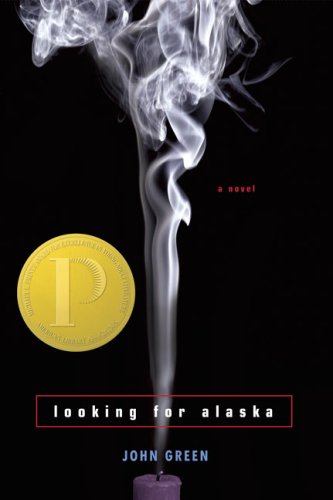Alright NKOTB fans, sing it with me,"Woah oh oh oh oh - Readin' Tough!"
Okay. Maybe not. For those who never quite got into boy bands of the late 1980's, I'll spare the cheesy intro and jump right to this week's Top Ten Tuesday topic, books that deal with tough issues. As always TTT is hosted by the awesome bloggers of
The Broke and The Bookish. For those visiting
Her Book Self for the first time, thanks for stopping by and I hope you'll check out some of my more regular content as well! I have eighteen books to spotlight today - and yes I know it's Top TEN Tuesday, but this is a list of eighteen books on ten tough issues. I tried to pull a sampling of both fiction (f) and nonfiction (nf). All of them are amazing books and the majority of them did make me cry - if it's underlined, it's linked to my review here or at LibraryThing. Without further ado (in no particular order):
Top Ten Books Dealing with Tough Issues
(Or Top Eighteen Books Dealing with Ten Tough Issues)
It's hard to think of a more appropriate tough topic to read about than the Holocaust, similarly it's difficult to think of just one book that deals with this topic amazingly well. For that reason, I've chosen three:
- The Book Thief by Markus Zusak (f)
- The Diary of a Young Girl by Anne Frank (nf)
- Night by Elie Wiesel (nf)
Anne Frank's Diary and Wiesel's memoir are both incredibly powerful and moving works, while Zusak's
The Book Thief, albeit fictional, takes such a different perspective on World War II Germany that I had to include it in my list as well.
2. Slavery and Racism in America
These should probably be listed as two separate tough issues but the length and strength of the books I came up with for all the topics on this list prompted a combine here. These two could also be listed under the very best books I ever had to read for schoolwork and there's a reason that a decade and a half after encountering them they remain two of my all time favorite works of literature.
3. Darfur and the Lost Boys of Sudan
I went with a nonfiction and a fiction pick for this one since I know some people are polarized about which they prefer to read. Both books are told with an excellent narrative voice (one real and one drawn) and though the stories in them are sometimes difficult to hear, they are stories that need to be told and need to be heard.
4. Genocide in Rwanda
Speaking of stories that need to be heard... Paul Rusesabagina's autobiography was the basis of the movie
Hotel Rwanda and as powerful as Hollywood is at telling harrowing stories, there is little impact as great as reading from Rusesabagina's own words.
Left to Tell is another first-hand account of the horrific events and the unconquerable nature of the human spirit. Meanwhile, Parkin's novel is a story of Rwanda recovering and rebuilding, a warm story of daily life that still includes the scars of the past but looks to a hopeful future.
5. Women in Afghanistan under the Taliban
Yes, I could have talked about
The Kite Runner as a book dealing with a number of tough issues, but I'm one of few that enjoyed Hosseini's second novel even more than his first. Though Afghanistan is rife with tough issues to tackle in literature, I wanted to spotlight these novels as dealing specifically with women living under Taliban rule. For those that want a nonfiction take, Rodriguez chronicles the experiences of an American woman living as an expatriate in Kabul and shares her own stories as well as those of her friends who grew up in the city.
6. Alzheimer's Disease (specifically Early Onset)
Remarkably told from the first person perspective of a female scientist suffering from Early Onset Alzheimer's Disease, this book takes an emotional and fully humanized inside study of the disease and its effects on the individual and all of the loved ones impacted by the degeneration of the mind.
7. Clashing Cultures in the World of Modern Medicine
- The Spirit Catches You and You Fall Down by Anne Fadiman (nf)
This one is borderline nerdy-science but also tells a fascinating story of a Hmong child with epilepsy. In the traditional culture epilepsy is seen as a gift where the seizures represent a communing with spirits but in Western medicine it is a disease to be cured. Fadiman's book looks at the communication break-down and lack of respect that occurs when two cultures clash and the life and health of the child caught between the factions.
8. Race, Poverty, and Inequality in Urban America
- There Are No Children Here by Alex Kotlowitz (nf)
When people rave about Erik Larson's
The Devil in the White City, this is the book that I respond with as a "Must Read" book about Chicago. (Not for anything against Larson's work, but this one to me speaks much more intensely about the city.) Following the true story of two brother's growing up on Chicago's West Side, the title comes from a quote in which their mother states, "There are no children here. They've seen too much to be children."
9. Child Abuse
I have a hard time reading books about all these topics, but child abuse especially is one that I would prefer to close my eyes to. However, I realize that no good comes from ignoring difficult topics and being aware of an issue is the first step towards doing something to stop it. I chose both a fiction and a memoir selection for this topic and though neither was pleasing, they both tell really important stories.
10. Deaf Culture, Animal Rights
I can't say enough good things about this book and animal rights and deaf culture are just two of the intense topics dealt with in this emotional and wonderful story. Character driven and beautifully told, this is the kind of book that manages to be heartwarming and heartbreaking at the same time.
So there you have my choices. As always, I'd love to hear which ones you agree and disagree with and I look forward to reading everyone else's lists too!



























































